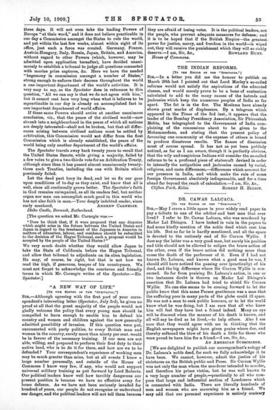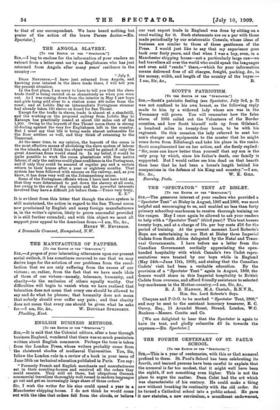DR. CAWAS LALCACA.
[To THE EDITOR OF THE " SPEC TATOR.'] SIR,—May I crave a little space in your widely read paper to pay a tribute to one of the whitest and best men that ever lived ? I refer to Dr. Cawas Lalcaca, who was murdered by Madar Lal Dhingra. I have looked in vain in the papers to find some kindly mention of the noble deed which cost him his life. But so far be is hardly mentioned, and all the space is devoted to the untimely end of Sir Curzon Wyllie. I dare say the latter was a very good man, but surely his position and title should not be allowed to eclipse the brave action of the other, even if the brave action did nothing more than cause the death of the performer of it. Even if I had not known Dr. Lalcaca, and known what a good man he was, I should still have noticed the passing over (practically) of his deed, and the big difference where Sir Curzon Wyllie is con- cerned. So far from praising Dr. Lalcaca's action, in one or two instances doubt is thrown on Ma,dar Lal Dbingra's assertion that Dr. Lalcaca had tried to shield Sir Curzon Wyllie. No one else seems to be coming forward to let the public know that this same Parsee gentleman was a man that the suffering poor in many parts of the globe could ill spare. He was not a man to seek public honours, or to let the world know what he was doing, but I am sure that all who knew him will feel they have lost a friend indeed. Many an eye will be dimmed when the manner of his death is known, and all will say he died as he lived,—to help others. Also I am sure that they would agree with me in thinking that the English newspapers might have given praise where due, and thereby softened the blow of his death a little for those who were proud to have him for a friend.—I am, Sir, Sce., AN AMERICAN SUBSCRIBER.
[We are delighted to publish our correspondent's eulogy of Dr. Lalcaca's noble deed, for such we fully acknowledge it to have been. We cannot, however, admit the justice of his strictures on the British public and Press. Sir Curzon Wyllie was not only the man whom the murderer intended to murder, and therefore his prime victim, but he was well known to a very large number of people,—practically to all who com- pose that large and influential section of Londoners which is connected with India. There are literally hundreds of men and women who are mourning him as a friend. We may add that our personal experience is entirely contrary
to that of our correspondent. We have heard nothing but praise of the action of the brave Parsee doctor.—ED. Spectator.]











































 Previous page
Previous page